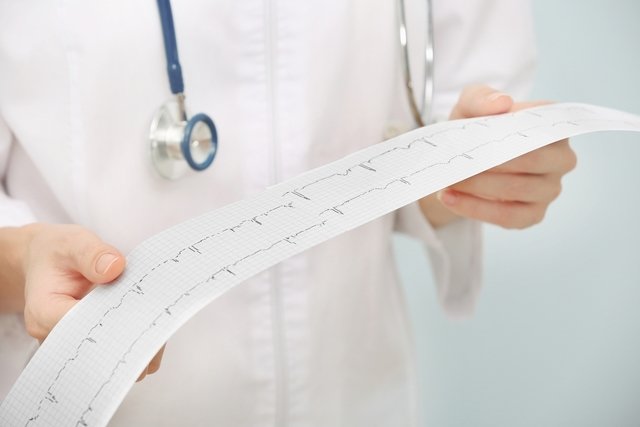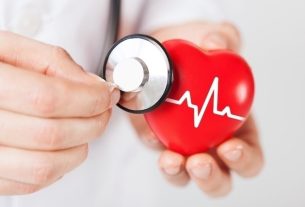Ventricular arrhythmia is when the stimulus that causes the heartbeat appears somewhere in the ventricles, causing abnormal heartbeats, which can cause symptoms such as chest pain or weakness, and even cardiorespiratory arrest.
Although the cause is not always identified, ventricular arrhythmias generally occur due to diseases that affect the heart, such as coronary disease or malformations. Furthermore, men and people with high blood pressure are at greater risk of having this type of arrhythmia.
If ventricular arrhythmia is suspected, it is important to consult a general practitioner or cardiologist for an evaluation. When treatment is indicated, it may involve medications, such as beta-blockers and antiarrhythmics, and even the application of shock, in cases of cardiorespiratory arrest.

Main symptoms
The main symptoms of ventricular arrhythmia are:
- Low pressure;
- Pallor;
- Excessive sweating;
- Weakness;
- Dizziness;
- Shortness of breathe;
- Chest pain or discomfort;
- Anxiety;
- Accelerated heart.
In some cases, there may be more serious symptoms, such as fainting and stopping breathing, which may indicate cardiorespiratory arrest and be life-threatening if treatment is not received. Find out how to identify a cardiorespiratory arrest and what to do.
If ventricular arrhythmia is suspected, it is important to consult a general practitioner or cardiologist for an evaluation. However, if symptoms are persistent or severe, such as low blood pressure or drowsiness, it is recommended to seek emergency care.
Online test for heart problems
To find out your risk of having a heart problem, select your symptoms in the test below:
Possible causes
Ventricular arrhythmia is generally caused by diseases that affect the heart such as heart malformations and coronary disease, however imbalances of minerals in the blood, such as magnesium and potassium, medications and the use of illicit drugs can also cause ventricular arrhythmias.
Although a cause is not always identified, people of advanced age, male sex, high blood pressure and who sleep little are at greater risk of developing this type of arrhythmia.
How to confirm the diagnosis
The diagnosis of ventricular arrhythmia is usually confirmed by a general practitioner or cardiologist through tests such as an electrocardiogram and a 24-hour Holter monitor to identify the type of arrhythmia.
However, other tests such as an echocardiogram, stress test and blood tests, such as potassium and troponin measurement, may also be indicated to assess the functioning of the heart and identify possible causes. Discover the main tests to evaluate the heart and what they are for.
How the treatment is carried out
Treatment for ventricular arrhythmia depends on the type of arrhythmia and the symptoms it causes. Although sometimes no specific treatment is necessary, the doctor may recommend the use of medications such as beta blockers, calcium channel blockers and antiarrhythmic drugs.
However, when the arrhythmia causes cardiac arrest, symptoms that last longer than 30 seconds or are severe, such as low blood pressure or drowsiness, emergency treatment is usually necessary and may involve injecting medications, such as antiarrhythmics, for example, and even even the application of shock.
Additionally, in some cases, the placement of an implantable cardioverter may be necessary for patients who do not respond well to medications. Check what the pacemaker is for and when it is recommended.
Bibliography
- STATPEARLS. Twist of Pointes. 2021. Available at: <https://www.ncbi.nlm.nih.gov/books/NBK459388/>. Accessed on Aug 9, 2022
- STATPEARLS. Premature Ventricular Contraction. 2022. Available at: <https://www.ncbi.nlm.nih.gov/books/NBK532991/>. Accessed on Aug 9, 2022
- STATPEARLS. Ventricular Fibrillation. 2021. Available at: <https://www.ncbi.nlm.nih.gov/books/NBK537120/>. Accessed on Aug 9, 2022
- STATPEARLS. Arrhythmias. 2022. Available at: <https://www.ncbi.nlm.nih.gov/books/NBK558923/>. Accessed on Aug 9, 2022
- STATPEARLS. Ventricular Tachycardia. 2021. Available at: <https://www.ncbi.nlm.nih.gov/books/NBK532954/>. Accessed on Aug 9, 2022

Sign up for our newsletter and stay up to date with exclusive news
that can transform your routine!
Warning: Undefined array key "title" in /home/storelat/public_html/wp-content/plugins/link-whisper-premium/templates/frontend/related-posts.php on line 12
Warning: Undefined array key "title_tag" in /home/storelat/public_html/wp-content/plugins/link-whisper-premium/templates/frontend/related-posts.php on line 13



